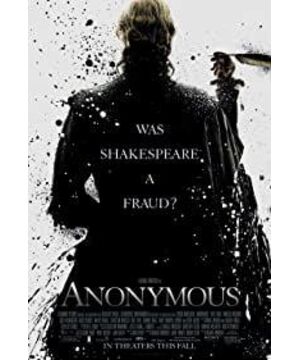Because of the long-standing respect for the genius of artists, the real anonymous author of Shakespeare's drama referred to in the film, the painful and failed life ending of Lord Edward, is considered to be the apostle-like dedication of the genius artist. This kind of understanding is very common today (even though it’s still purgatory to experience it), look at Edward’s self-confession in the film: "Those voices, I can’t calm them, but they find me-in my sleep, waking, eating , Walking on the promenade... the sweet expectations of the girls in the boudoir, the ambition of the courtiers, the tricks of the murderers, the plea of the victims... Only I wrote all this on the parchment, the words about them, They will be liberated and free when their voices are heard. Only then can my heart be quiet and calm. If I don’t write down those voices, I will go crazy.”
Just like the film’s sympathy for Lord Edward, Regarding the salvation of genius sacrifice, it is necessary for the Western artists after the Middle Ages-and especially when the word "sublime" gradually replaces God-either true or false: it divides the greatness and mediocrity of art. Here, the movie is not the true reality of Shakespeare's plays, although Shakespeare in history doubtfully possessed both amazing artistic genius and excellent professional speculation ability. In addition to attracting the attention of watching movies, this legendary replica of Shakespeare's drama touches a subtle suspense: the secret of being a genius in the world. The secret is naturally dark.
The dark metaphor is the shocking secrets of Lord Edward and Queen Elizabeth. In fact, there are not only secrets, but only in the court that they are legally and publicly hated secretly; taboo and sacredness are only discussed at this level-the creator of "Shakespeare" Lord Edward, in the name of love and joy, The lover who entered deeply is not only the Queen Elizabeth I who made him fascinated, but also his biological mother (of course he did not know it); just as his biological father bred him in the same name, he also bred himself and Unconventional child of a biological mother. At the same time, the foundation of the name as the name in the world is destroyed. This metaphor contains the secrets of art in the world, and it reminds how art that has escaped the constraints of religious doctrines is self-derived. What it reminds is that a certain superhuman secret of human nature summoned Edward with the genius of "those voices" for no reason, and Edward has no reason to judge whether his listening to "those voices" is like His wife said: "You are possessed by the devil." "Even Greek drama can't be compared with it"-the crazy audience in the film once praised Shakespeare's genius. Secrets transcend the times, transcend values, transcend judgments.
Finally, Artil Rimbaud, who "no longer thinks about literature", once expressed his opinion on how to become a poet: "He became a great patient, a great criminal, a great defendant—and the greatest knower beyond all. Because he went deep into the unknowable, even if he went mad and finally lost the understanding of his imagination, he saw them satisfactorily! When he jumped into the things he had never heard of and could not be named When things are in progress, let him destroy: other terrible laborers will come out from there; they will start where others have destroyed." The world's attitude towards genius matches the sensational confession of genius. For example, in the film, Cecil, the princely minister of the dynasty, has always been wary of the drama (and even art) that arouses cheers, and does his best to expel and destroy the drama in the name of God. Cecil’s reasoning is that drama has a powerful force that is difficult to guide and inspire people’s hearts. This power can cause idols to replace, and make people forget God and the affairs that God has entrusted to them. Inducing chaos in reality. The order of theocracy, the stability of the kingdom and its benefits are more than anything else. At the beginning of the story, Edward asked the talented playwright Ben Johnson to sign his play and stage it, not just because he was a playwright who insulted Edward’s 17th-generation Lord of Oxford and the minister in charge of the United Kingdom, but Benna. The "little comedy" was quite a political incitement to the Tower of London, and Edward felt a certain similarity: an opportunity to exercise a certain power to break through the evil reality outside of his inner hearing. Edward sarcastically said that he could not understand the relationship between art and reality: "All art is political, otherwise it is decoration. All artists have something to say, otherwise he might as well go making shoes." The Lord's artistic confession is not contradictory. Since it is an absolute call of "those voices", such power will change the world he faces in any case like changing him. The vigilance of Cecils in history is not groundless, talented artists are secret (pagan?) Moses.
For Cecil, the specific Oedipal desire and incest are not the greatest evil (he handled and covered all the consequences of incest in the court more appropriately in the film story), but the greatest evil is the "superhuman secret" Eliminate taboos, eliminate the secret cork of good and evil guarded by Cecils-the bottle of order that taboos all anonymous forces in the world (the bottle of order even tolerates all kinds of evils that do not violate order). Edward tried to open it, through art, "Word", the power that Lord Edward gave him with this word-and unleashing this anonymous power to the world-to save his offspring who could not be marked by the world. A large list of geniuses can be listed here. Most of them carry the moral shame of this world. The world is the battlefield where geniuses and Cecil hate and kill each other. In the film, the crowd walked out of the "destructive" theater where Lord Edward's son and brother were both sons and brothers. They were quite convinced that they were moved, and they were no less than the Edward who directly heard the "voices". They rushed to the street desperately. But the tragedy is not that they were finally blown into pieces of meat by Cecil's shells and flew into the sky-Shakespeare has already written this scene (today scholars have conclusively confirmed that people after the 20th century are pieces of meat flying in the sky); The tragedy lies in the fact that these doomed readers used to be God’s, then genius, and then the readers of the secrets of the palace and the cannonballs, and the deceitful people in the film who are actually called "Will", who are not reconciled to the reality of being a third-rate actor in the theater. Like Shakespeare, the world's leading actor, they don't know how to write.
At the end of the later romantic period, TS Eliot warned readers who had gone too far in the romance: "(People) have an emotional state in their hearts that is caused by the infectious power of poetry and mistaken it for poetry. This emotional The state is just a kind of indulgence of his own emotions." He also said: "Poetry is not about indulging emotions, but avoiding emotions, not expressing individuality, but avoiding individuality. Naturally, only people with individuality and feelings will know to escape. What is the meaning of this kind of thing." The genius Eliot seems to be very Cecil here, but it is not surprising that without Cecil, there would be no Elizabeth’s 44-year strongest British history, and there would be no negative side to it. ——Edward's "genius" type of existence possibility. "
In an era without artists, there are unnamed craftsmen. Their production must depend on such things as the will of God represented by the church, and the only name is the name of the god (in earlier Greek times, the status of technical craftsmen was slaves, and they served the city-state for the temple and all the collective will). The "genius" self-awareness that the craftsmen exert in the production must also be true or false to gain the identity of people and themselves in the name of God. No one can figure out whether those great productions are the geniuses of the producers. Still a gift from God. The story told by "Anonymous" happened in an era when the artist was independent and wanted to begin to listen to his own God alone. The "genius" was named and the God was looming behind him (it is said that the reading needs of Shakespeare's works were at that time). Has been equal to the "Bible"). Some studies say that the great human awakening in Renaissance art was also due to a change in the identity of art funders, from churches and guilds to funding from emerging economic entities (kings or nobles or the bourgeoisie)--think Think of Shakespeare's "Merchant of Venice", it's a hate and love. So it’s not difficult to understand why, when Lord Edward’s experience unfolds in this context, why the artists in the film are composed of three parts—in fact, for hundreds of years, every great talented artist we know and love has possessed These three layers are indispensable-listener, messenger and performer. This is the name of the "William Shakespeare" three-part artist in the world, and it has contributed to or completely echoed the urgent needs of readers who cannot and cannot write.
View more about Anonymous reviews











